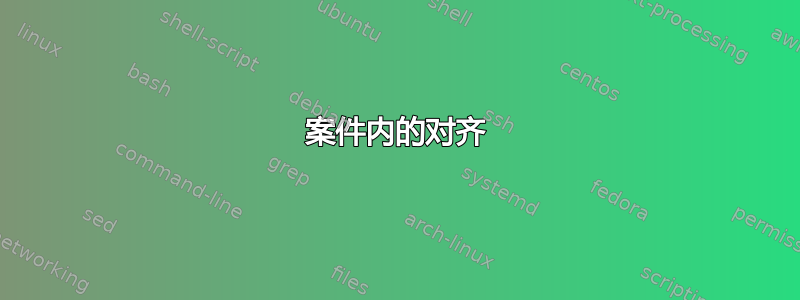
我试图对齐if以下 MWE 中的 ',但同时保持(n times)对齐完整。应用来自多重 = 对齐以及来自协调案例环境中的条件,我还是无法让它工作。
\documentclass[12pt,a4paper]{article}
\usepackage[fleqn]{amsmath}
\begin{document}
\begin{equation*}
ns =
\begin{cases}
\quad s + s + ... + s & \text{ (n times) if } n > 0 \\
\quad\quad\quad 0 & \text{ if } n = 0 \\
\quad (-s) + (-s) + ...+ (-s) & \text{ (n times) if } n < 0
\end{cases}
\end{equation*}
\end{document}
顺便问一下,有没有什么办法可以去掉那个丑陋的\quad?(这里每个问题一个问题适用吗?:)
答案1
您可以\hphantom在第二行使用来移动文本,或者\hfill,正如Mico在评论中提到的那样。
那么 s的用途是什么\quad?
\documentclass[12pt,a4paper]{article}
\usepackage[fleqn]{amsmath}
\begin{document}
\begin{equation*}
ns =
\begin{cases}
s + s + \dots + s & \text{ ($n$ times) if } n > 0 \\
0 & \text{\hphantom{ ($n$ times)} if } n = 0 \\
(-s) + (-s) + \dots + (-s) & \text{ ($n$ times) if } n < 0
\end{cases}
\end{equation*}
\end{document}
如果要更改 中的列对齐方式cases,一种可能性是借助 定义一个新环境mathtools,如中所述在案例环境中右对齐第一列例如,使第一列居中,第二列右对齐:
\documentclass[12pt,a4paper]{article}
\usepackage[fleqn]{mathtools}
\makeatletter
\newcases{crcases}{\quad}{%
\hfil$\m@th\displaystyle{##}$\hfil}{\hfil$\m@th\displaystyle{##}$}{\lbrace}{.}
\makeatother
\begin{document}
\begin{equation*}
ns =
\begin{crcases}
s + s + \dots + s & \text{ ($n$ times) if } n > 0 \\
0 & \text{ if } n = 0 \\
(-s) + (-s) + \dots + (-s) & \text{ ($n$ times) if } n < 0
\end{crcases}
\end{equation*}
\end{document}
答案2
带有aligned(来自amsmath包装):
\documentclass[12pt,a4paper]{article}
\usepackage[fleqn]{amsmath}
\begin{document}
\[
ns = \left\{\begin{aligned}\quad
& s + s + \dotsm + s & \text{ ($n$ times) if } n & > 0 \\
& 0 & \text{ if } n & = 0 \\
& (-s) + (-s) + \dotsm + (-s) & \text{ ($n$ times) if } n & < 0
\end{aligned}\right.
\]
\end{document}
答案3
应该与“(n次)”到“如果”而不是从公式和“(n次)”,在我看来。
0 应该像其他两个项一样保持齐平。我还修复了数学错误(应该是 |n| 在第三行)。
\documentclass[12pt,a4paper]{article}
\usepackage[fleqn]{amsmath}
\begin{document}
\begin{equation*}
ns =
\begin{cases}
\begin{alignedat}{3}
&s + s + \dots + s &\quad \text{($n$ times)} &\qquad& \text{if $n > 0$} \\
&0 &\quad &\qquad& \text{if $n = 0$} \\
&(-s) + (-s) + \dots + (-s) &\quad \text{($|n|$ times)} &\qquad& \text{if $n < 0$}
\end{alignedat}
\end{cases}
\end{equation*}
\end{document}
答案4
有empheq、eqparbox和 的alignat*, which allows for several alignment points, and full control on the spacing between columns. I also propose another layout (better in my opinion) which requires only情况:
\documentclass[12pt,a4paper]{article}
\usepackage[fleqn]{empheq}
\usepackage{eqparbox}
\newcommand\eqmathbox[2][M]{\eqmakebox[#1]{$ \displaystyle#2 $}}
\usepackage[showframe]{geometry}
\begin{document}
\begin{empheq}[left = {ns=\empheqlbrace\,}]{alignat*=2}
&\eqmathbox{s + s + \dots + s} & \text{ (n times) } & \text{if } n > 0 \\
& \eqmathbox{0} & & \text{if } n = 0 \\
& (-s) + (-s) + \dots+ (-s) & \qquad\text{ (n times) } & \text{if } n < 0
\end{empheq}
\begin{equation*}
ns =
\begin{cases}
\eqmathbox[C]{\,s + s + \dots + s} \text{\quad (n times)} & \text{ if } n > 0 \\
\eqmathbox[C]{\,0} & \text{ if } n = 0 \\
\, (-s) + (-s) + \dots + (-s) \text{\quad (n times)} & \text{ if } n < 0
\end{cases}
\end{equation*}
\end{document}








